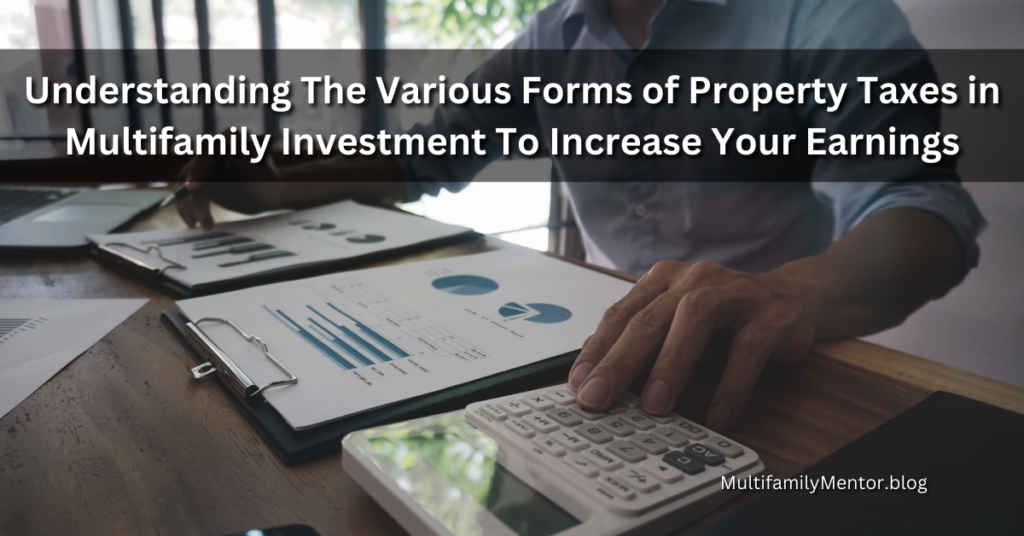Understanding the different forms of property taxes in multifamily investing will help you increase your profits and decrease your costs. Read our post and speak with a tax expert right away!
Executive Summary
One of the major costs associated with owning a multifamily home is property taxes. Understanding the various property tax kinds you can experience as a multifamily investor is essential to managing spending and budgeting effectively. The numerous property taxes associated with multifamily investing, including property tax assessments, special assessments, transfer taxes, income taxes, and sales taxes, will be covered in this article. We'll also give you crucial knowledge and advice on how to reduce your property taxes, stay out of trouble, and save money.
Introduction
Understanding the various property tax kinds you can experience as a multifamily investor is essential to managing spending and budgeting effectively. The location, size, and condition of the property all have an impact on the property tax, which is calculated based on the assessed value of the property. You can save money, avoid fines, and prepare for taxes in advance by being aware of the many forms of property taxes and the ramifications they have.
Property tax evaluations
Investors in multifamily properties typically pay property taxes in the form of assessments. The local government or county assessor decides the assessment, which is often based on the value of the property. These are some critical considerations regarding property tax assessments:
- Property tax assessments can vary depending on the location, size, and condition of the property.
- Property tax assessments are usually based on the value of the property.
- Property tax assessments can be appealed if you believe they are incorrect.
Special Assessments
Special assessments, a type of property tax, are imposed for particular local government services or improvements, like roadway maintenance or water and sewer system upgrades. Here are some critical considerations regarding special assessments:
- Certain local government services or enhancements are subject to special assessments.
- The advantage that the property receives from the improvement or service is typically taken into account when calculating special assessments.
- If you think a special evaluation is in error, you can challenge it.
Taxes on Transfers
When a piece of property changes hands, a transfer tax may be levied. Depending on the local rules, the buyer or seller is typically responsible for paying the tax, which is typically a percentage of the property's sale price. The following are critical transfer tax considerations:
- Transfer taxes are a type of tax levied when ownership of a property changes.
- Transfer taxes might vary based on the region and local legislation, but they are often a percentage of the property's sale price.
Payroll Taxes
Another type of property tax associated with multifamily investing is income taxes. You must pay income taxes on the rental revenue you earn from your buildings as a multifamily investor. These are some crucial considerations about income taxes:
- There are federal and state taxes on rental income;
- Deductions can be taken to lower taxable income.
- Speak with a tax expert to be sure you're claiming every possible deduction.
Taxes on sales
A type of tax that is levied on the purchase of goods and services is the sales tax. Sales taxes may apply to you as a multifamily investor when you buy supplies or services for your properties. These are some crucial considerations regarding sales taxes:
- Sales taxes can be a substantial price, particularly for large projects, and might vary based on the area and local rules.
- Speak with a tax expert to make sure you are using all permitted exemptions and deductions.
Conclusion
Finally, it should be noted that property taxes are a substantial cost associated with multifamily investing, and that managing costs and budgeting for taxes requires a thorough understanding of the many types of property taxes. Property tax assessments, special assessments, transfer taxes, income taxes, and sales taxes are just a few of the different property taxes associated with multifamily investing. It is critical to keep in mind that these taxes can change based on the property's location, size, and condition, as well as on regional rules and regulations.
Maintaining the property, keeping accurate records, and challenging any erroneous or exceptional assessments are all necessary to reduce property taxes. It is also essential to speak with a tax expert to make sure you are using all permitted credits, exemptions, and deductions.
You may save money, stay out of trouble, and make wise financial plans if you are aware of the various property taxes that apply to multifamily investments. We trust that this post has given you useful advice on how to handle your property taxes and make future plans.

